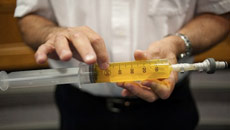If this information stands true, the history books have to be rewritten soon. According to scientists, some parts on the coldest region on our earth - Antartica - was as warm as today's California coast.
Not only this, polar regions of the southern Pacific Ocean registered 21st-century Florida heat, according to scientists who used a new measurement technique called carbonate clumped isotope thermometry to measure past temperatures.
By measuring concentrations of rare isotopes in ancient fossil shells, the scientists found that temperatures in parts of Antarctica reached as high as 17 degrees Celsius during the Eocene epoch (lasting from 56 to 33.9 million years ago) with an average of 14 degrees Celsius.
Eocene temperatures in parts of the southern Pacific Ocean measured 22 degrees Celsius, similar to seawater temperatures near Florida today, researchers from Yale University emphasised.
The average annual South Pacific sea temperature near Antarctica today is about 0 degrees Celsius.
“Quantifying past temperatures helps us understand the sensitivity of the climate system to greenhouse gases, and especially the amplification of global warming in polar regions,” said Hagit Affek, an associate professor of geology and geophysics at Yale.
The findings highlight the potential for increased warmth at earth's poles and the associated risk of melting polar ice and rising sea levels, the researchers warned.
“By measuring past temperatures in different parts of Antarctica, this study gives us a clearer perspective of just how warm Antarctica was when the earth's atmosphere contained much more CO2 than it does today," said lead author Peter M.J. Douglas.
This provides strong evidence that global warming is especially pronounced close to the earth's poles.
Warming in these regions has significant consequences for climate well beyond the high latitudes due to ocean circulation and melting of polar ice that leads to sea level rise, said the study, published in the journal Proceedings of the National Academy of Sciences.





